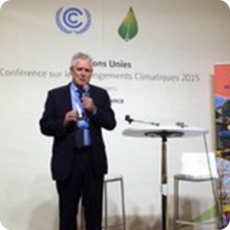Despite the 2015 Paris Agreement within the United Nations Framework Convention on Climate Change which has set the goal of limiting global warming, carbon emissions continue to constantly increase. From threatening food production to rising sea levels that increase the risk of catastrophic flooding, the impacts of climate change are unprecedented in scale. We asked several international experts to evaluate the UN efforts in the fight against climate change and what is holding the UN back.

“There are five main factors that are influencing the effectiveness or otherwise of the global fight with climate change. The first is the separation of debate and decision making associated with global climate and development agendas. Secondly, there is a great deal of inconsistency in our applied understanding of what constitutes genuine “climate action” particularly in the context of the SDGs. Thirdly, UN Member States set global agendas and their reluctance to commit to binding agreements should be a cause for concern. Fourthly, local government representation in global and national debates is inconsistent and mostly lacking. Finally, diplomacy will always win out and this will prevent and or hinder the ability of the UN Secretariat to influence essential global reforms that will assist Member States in achieving more effective and sustained development and climate change outcomes on the ground”.

“The efforts by the UN to fight climate change are slowly becoming popular worldwide as citizens across the world become aware of the effects of it. The publications by IPCC have been insightful and widespread empowering government and its people with knowledge regarding climate change. The slow adoption of incorporating climate change financing across all sectors seems to hold the UN back. Climate change financing should be mainstreamed in the daily activities of the various governments’ agendas”.

“The effectiveness of UN efforts in fighting climate change is partly a function of the UN member states adequately supporting the UN bodies in their climate plans, policies, programmes, and strategies of addressing the challenge. Its effectiveness is also measured by the implementation of concrete climate actions by member states at local, national and/or regional level. These two critical factors have lagged behind in the global fight against climate change. The economics and geopolitics of climate change in climate negotiations coupled with the perceived fear of loss of control of political and/or economic powers by some member states continued to be major drawbacks for the UN efforts to combat climate change.”

“The world faces various regional geopolitical conflicts, colossal economic clashes and a political chaos that characterizes world leaders in both hemispheres. While these disputes, negotiations and disagreements are happening, many species become extinct daily. The availability of drinking water is reduced. Agricultural borders expand and forests recede. Floods caused by river overflows and thaws that increase the level of water cause the disappearance of various islands, coastal and continental territories. Forest fires consume surfaces equivalent to entire nations in a few weeks, aided by strong winds. The control and rescue brigades are thwarted in their operations in the face of the huge and scorching element of the fire that consumes, with its embers, all in its path.”

“Although setting goals, especially with the 1.5C is commendable, and the year 2050 may be accepted at national government level, the actual strategies of how to achieve this are not clear even among the ministers who are in charge of climate change in various countries. For example, in the just concluded UN climate action summit in New York, many countries including China, Germany, India, Poland etc. had their ministers adopt a non-committal approach to the global targets. This has resulted in more talk, more negotiations, more time to think of strategies to reach the 2050 targets by many countries yet carbon emissions still continue.”
Check all the open positions available on DevelopmentAid platform regarding climate change in international development here.

